I need to create a class with exactly the same methods as java.lang.String.
What is the best way to do this in Java?
I know that I can't extend String class as it is final. I am not looking at solutions where I need to copy the source code of java.lang.String. For example, assume that I need the functionality length() within my custom class named MyString, which has a corresponding 'myLength()` method.
What is the best way to implement myLength()?
I am not looking at various algorithms to find out the length of a string but to reuse String's length() method. Now once I have MyString class ready, I should be able to use it anywhere for my custom manipulations.

